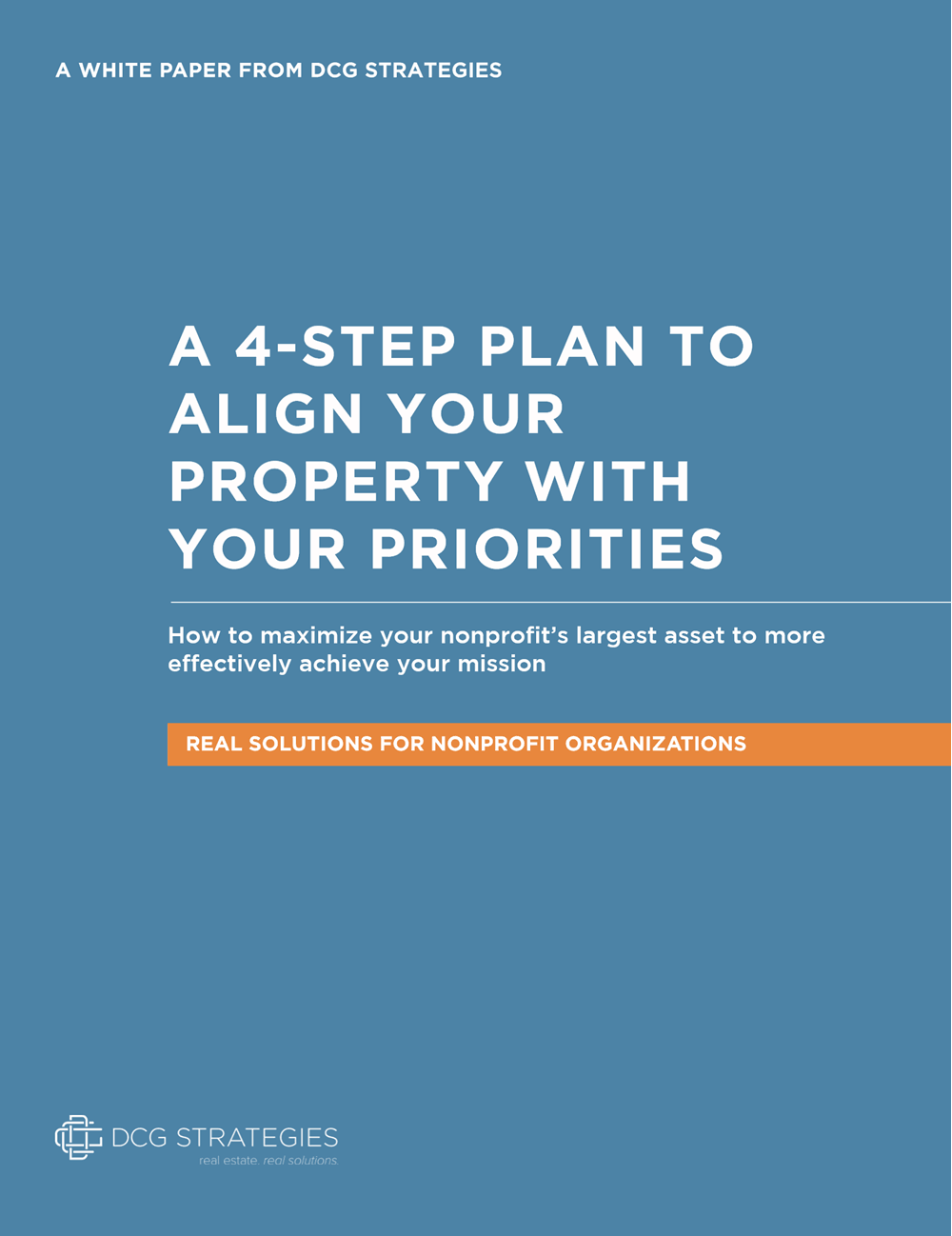Navigating the world of commercial real estate can be confusing for churches and faith-based communities, so you can certainly benefit from having brokerage services that are tailored to meet the unique interests of your community-based organizations.
The expert team at DCG Strategies is happy to answer any questions you may have as a faith-based community with any concerns related to commercial real estate. While many of our clients’ most commonly asked questions are listed below, we also invite you to contact us for more information about our church real estate services.
It depends on the zoning laws where the church is located. There are three main types of zoning: residential, commercial and industrial. A church refers to a place of worship, and can include temples, mosques and synagogues, as well as related faith-based associations such as seminaries and mission organizations. Although churches and their related associations are nonprofit, tax exempt organizations, the property may be located in a commercial zone, and therefore considered commercial.
Churches fall into a special zoning category as special use property. With the special use permit, churches can be located in either a residential neighborhood or a commercial district. Although churches and religious organizations are regulated by similar zoning laws as other organizations, they have been afforded special protection due to past zoning ordinances that sought to prevent churches from inhabiting certain areas. In 2000, Congress passed The Religious Land Use and Institutionalized Persons Act (RLUIPA) to protect churches and religious organization from zoning ordinances that would target churches for different or unfair treatment.
It depends on how the property is rezoned. Rezoning can either increase or decrease a property’s value, as the value of real estate is dependent on what can legally be done with a property. In many instances, if a property is rezoned from residential to commercial, it can yield more value.
An “as-is” appraisal estimates the value of a property at that moment in time, while a full feasibility study evaluates the value of a property based on future potential, looking at all possible uses. Feasibility studies examine the property as well as opportunities offered by its surrounding environment and resources, taking into account any successful business ventures that could be developed at a later date.
Yes. You can enter into a contract with the individual or group who purchases your land. This contract, sometimes known as a real covenant, can require the future owner to only use the land as permitted in the contract. A real covenant can impose restrictions on how the land may be used after it is sold.
A number of factors must be evaluated to determine whether buying or leasing is the better option for your faith community. Questions to consider include whether your budget allows for periodic rent increases, whether you would have to finance the majority of a purchase, and if so, could the down payment be raised through a church capital campaign. Additionally, you would need to consider how financing a sale could impact the church’s existing ministries.
When clergy housing is designated, the pastor determines the amount to be set aside for the housing allowance, which must be approved by the church finance committee. The church must pay for the cost of all utilities and repairs for a parsonage or manse. Congregations with clergy housing are recommended to also provide a housing equity allowance and a furnishing allowance. A housing equity allowance gives a retiring pastor the opportunity to purchase a home and a furnishing allowance covers of household expenses. These allowances are designated by the finance committee. For social security purposes, a fair rental value of clergy housing must be evaluated by an objective third party.
State colleges, school districts and other educational organizations have unique needs when it comes to commercial real estate. Not only are you thinking about asset management, but you’re also weighing the needs of your school, students and their families, and the surrounding community.
Here, the commercial real estate professionals at DCG Strategies answer the most frequently asked questions we hear from our education real estate clients. If you have any issues that are not addressed below, please feel free to contact us for more information about our services.
Yes, in the sense that it isn’t residential. However, educational organizations like school districts or state colleges certainly have different needs compared to the typical commercial real estate transaction. For this reason, it’s extremely important to look at your long- and short-term goals before making a final decision about any school property.
No. While there have been exceptions made by the State in the past, currently proceeds are almost exclusively only allowed to be utilized for capital needs. Proceeds from lease revenue however can be added to a district’s general fund.
Yes, any one of our team members can manage a range of public engagement and communication campaigns to help schools and educational institutions comply with relevant codes and successfully navigate the committee process. The State of California Education Code requires the formation of an advisory committee of no fewer than seven and no more than 11 members to discuss surplus property or real property prior to that property’s sale or lease. There are changes each year to when a surplus committee is required for disposition of property so be sure to reach out to us.
Before acquiring new property, a school district must have a comprehensive master plan in place that outlines the intended use and budgets for the new property. A site selection team of appropriate stakeholders is formed to help determine the site of the new property and make recommendations to the school board. The process for acquiring new school property is transparent, engaging the public as well as governmental agencies or other affected parties in the planning process. Once a site has been chosen, it must go through a regulatory process for state approval. During the regulatory process, the school district must provide the state with specific information about the characteristics of the proposed new property. These characteristics are identified through thorough research by staff or consultants.
An “as-is” appraisal estimates the value of a property at that moment in time, while a full feasibility study evaluates the value of a property based on future potential, looking at all possible uses. Feasibility studies examine the property as well as opportunities offered by its surrounding environment and resources, taking into account any successful business ventures that could be developed at a later date.
Absolutely! More and more districts are looking into how their underutilized real property can be re-purposed into a recruitment and retention tool by developing rental housing for employees on-site. While there are a number of complexities to wade through, it can be a unique tool to support your district over the long-term and a source of recurring lease revenue.





